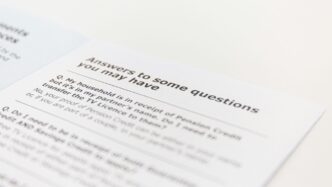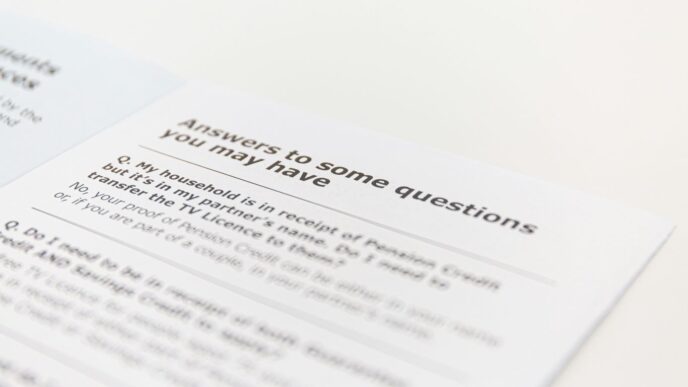So, you got an interview offer, which is great! But sometimes, things change, and you realize the job isn’t the right fit, or maybe another opportunity popped up. It happens to everyone. The trick is knowing how to politely bow out without making a bad impression. Learning how to write a proper decline an interview email is a skill that can actually help your career down the line. It’s all about being respectful and keeping those professional bridges intact.
Key Takeaways
- Always thank the company for the interview offer. It shows respect and keeps things professional.
- Keep your decline an interview email short and to the point. No need for long explanations.
- Respond promptly. Don’t wait until the last minute to cancel; it messes up their schedule.
- Maintain a positive tone. Avoid complaining or comparing offers; you never know when you might cross paths again.
- Consider recommending another candidate if you know someone suitable. It’s a nice gesture that can help both the company and your contact.
The Importance of Professionalism When Declining an Interview
So, you got an interview offer. That’s great news, right? But sometimes, you have to say no. Maybe you’ve accepted another job, or the timing just isn’t right. Whatever the reason, how you handle turning down that interview really matters. It’s not just about saying no; it’s about how you say no.
Your professional reputation is on the line every time you communicate with a potential employer. Think of it like this: if you handle this situation with grace and respect, it reflects well on you. It shows you’re considerate of other people’s time and that you’re serious about your career path. On the flip side, a sloppy or last-minute cancellation can make you look unreliable. In today’s world, where people often connect online and word can spread, leaving a good impression, even when declining, is a smart move. It’s about being selective with your time and showing that you value both your own career and the time of those offering you opportunities.
Maintaining Your Professional Brand
When you decline an interview, you’re not just saying no to a single meeting; you’re sending a message about who you are as a professional. If you’re always polite, prompt, and clear in your communications, even when it’s to turn something down, people will notice. This consistent professionalism builds trust. It tells future employers that you’re someone who communicates well and respects their processes. It’s like building a good reputation brick by brick. Declining thoughtfully means you’re actively managing how others see you in the job market.
The Impact of Your Communication Style
How you phrase your decline can make a big difference. A simple, polite email is usually fine, but sometimes a phone call might be better, especially if you’ve already spoken with someone directly or if the interview is very soon. For example, if you’ve had a good chat with a hiring manager and then need to cancel, a quick call shows extra consideration. It’s about matching your communication method to the level of interaction you’ve already had. A well-worded message, whether spoken or written, shows you’ve put thought into it, which is always appreciated.
Choosing the Right Communication Method
Most of the time, an email is perfectly acceptable for declining an interview. It’s quick, efficient, and gives you a record of your communication. However, if you’ve already had a phone conversation with the recruiter or hiring manager, or if the interview is scheduled for very soon, a phone call might be a more personal and respectful way to decline. It shows you’re willing to take a little extra time to communicate directly. Consider the relationship you’ve built so far; a more personal touch can go a long way in maintaining a positive connection.
Key Elements of a Decline an Interview Email
So, you’ve got an interview offer, which is great, but it’s just not the right fit for you right now. Maybe you’ve accepted another position, or your circumstances have changed. Whatever the reason, you need to let the company know you won’t be attending. It’s not just about saying no; it’s about how you say no.
Expressing Gratitude and Brevity
First off, always thank them for the opportunity. Seriously, a simple "Thank you for offering me the interview" goes a long way. It shows you respect their time and effort. Then, get straight to the point. You don’t need to write a novel explaining why you can’t make it. Keep it short and sweet. Think of it like this: you’re just giving them a heads-up, not writing a thesis.
Maintaining a Positive and Respectful Tone
Even though you’re declining, try to keep things positive. Avoid sounding negative or complaining about the role or the process. You never know when your paths might cross again, so it’s best to leave on good terms. Think of it as keeping your professional reputation intact. A polite tone makes sure you don’t burn any bridges, which is always a good idea in the job market. It’s about being considerate, even when you’re saying no.
Avoiding Unnecessary Details or Comparisons
This is a big one. You don’t need to tell them you got a better offer, or that the salary wasn’t high enough, or that you’re too busy. Honestly, it’s none of their business. Just a simple statement that you won’t be able to attend the interview is enough. Comparing offers or giving too many personal details can sometimes backfire. Stick to the facts and keep it professional. For instance, you might say, "I have decided to pursue another opportunity that aligns more closely with my current career goals." This is polite and doesn’t overshare. It’s also a good idea to let them know as soon as you’re sure, so they can offer the slot to someone else. This shows you’re thinking of them, too. If you’re unsure about how to phrase things, looking at sample decline emails can be helpful.
Timing Your Decline an Interview Email Effectively
So, you’ve got an interview offer, which is great! But maybe it’s not the right fit, or something else came up. That’s totally fine, but when you tell them matters. Sending a decline email too late can really mess up their schedule and make you look unprofessional.
Think about it: hiring managers plan their days around these interviews. If you cancel last minute, they have to scramble to fill that slot, which wastes their time and the company’s money. It can even slow down their whole hiring process. Nobody wants to be that person who causes a headache.
The Golden Window for Declining
When should you hit send? It really depends on how far along you are in the process. For a quick phone screen, giving them 24 to 48 hours’ notice is usually okay. But if it’s a more involved interview, maybe an in-person one where they’ve blocked out a chunk of time, try to give them at least 72 hours. This gives them a decent chance to adjust their plans or offer the slot to someone else. It’s all about showing you respect their time.
The Impact of Last-Minute Cancellations
Canceling right before an interview, or even worse, not showing up at all (a no-show), is a big no-no. It’s incredibly disruptive. It makes you look unreliable and can seriously damage your reputation. Companies talk, and word gets around. You don’t want to be remembered for flaking out.
Responding Promptly But Thoughtfully
While you don’t want to cancel last minute, you also don’t want to respond too quickly. It’s good to take a day or two to really think it over. This shows you considered the offer seriously. However, don’t wait so long that the interview is already scheduled for tomorrow. Find that sweet spot where you’ve made your decision but still give them enough notice to adjust. It’s a balancing act, really. Embracing technology in your business can help streamline these kinds of communications [3c69].
Here’s a quick breakdown of notice periods:
- Phone Screen: 24-48 hours notice
- In-Person/Video Interview: 72+ hours notice
- Final Round Interviews: As much notice as humanly possible, ideally over a week if you know that far in advance.
Remember, a timely and polite decline is always better than a no-show or a last-minute cancellation. It keeps your professional image intact and might even open doors later on.
Crafting Your Decline an Interview Email: Best Practices
So, you’ve decided an interview isn’t the right move for you right now. That’s totally fine, but how you handle it matters. Think of it like this: you wouldn’t just ghost someone you made plans with, right? Same idea here. Keeping things professional is key, and it doesn’t take much effort.
Concise and Clear Messaging
When you write your email, get straight to the point. Nobody wants to read a novel explaining why you can’t make it. A few sentences are usually enough. You want to let them know you appreciate the invite but won’t be attending. That’s it. No need for a long story.
The Power of a Simple Thank You
Always, always thank them for their time and the opportunity. It’s a small gesture, but it goes a long way. It shows you respect their process and their effort in considering you. A simple "Thank you for considering me for the [Job Title] position" is perfect. It’s polite and professional, and it leaves a good impression. You can find some helpful email templates if you’re stuck on wording.
Keeping it Under Ten Sentences
Seriously, aim for brevity. Your goal is to inform, not to write an essay. Most decline emails should clock in at around five to seven sentences. This keeps it easy for the hiring manager to read and understand quickly. It also shows you value their time as much as they value yours. Here’s a quick breakdown of what to include:
- Salutation: Address the hiring manager or recruiter by name.
- Gratitude: Thank them for the interview opportunity.
- Decline Statement: Clearly state you will not be attending.
- Brief Reason (Optional): A very short, general reason is okay, but not required.
- Closing: A polite closing remark.
Remember, you don’t need to explain every detail. Just keep it clean, polite, and to the point. It’s about maintaining a good connection for the future, even if this specific role isn’t the one.
Strategic Approaches to Declining an Interview

Sometimes, saying ‘no’ to a job interview is the smartest move you can make for your career. It’s not just about turning down a role; it’s about being smart with your time and energy, focusing on opportunities that truly align with what you want. Plus, how you handle these declines can actually make a good impression and keep doors open.
Recommending an Alternative Candidate
If you know someone who would be a great fit for the role you’re declining, passing along their name can be a really nice gesture. It shows you’re helpful and still engaged with the company, even though you’re not moving forward yourself. It’s a way to contribute positively even when you’re saying no to the interview.
Suggesting Alternative Interview Formats
Maybe the scheduled interview format just doesn’t work for you, or you feel a different approach would be more efficient. You could suggest a shorter introductory call first, or perhaps a phone interview instead of an in-person one if that’s more feasible. This shows you’re still interested but need a slight adjustment to make it work.
- Initial Screening: A brief phone call might be enough.
- Mid-Level Interviews: A video conference could be a good alternative to an in-person meeting.
- Later Stages: If time is tight, propose a focused discussion on specific project areas.
Exploring Other Role Opportunities
Sometimes, you might get an interview for a role that isn’t quite right, but you know the company has other positions that would be a much better match for your skills. It’s perfectly fine to mention this. You could say something like, "While the [Job Title] role isn’t the perfect fit for me right now, I noticed you also have an opening for [Different Job Title]. Given my background in [relevant skill], I’m very interested in that opportunity and would love to discuss it further." This shows you’ve done your homework and are genuinely interested in contributing to the company in a more suitable capacity.
Turning Declines into Future Opportunities
So, you’ve decided to decline an interview. It happens. Maybe the role isn’t quite right, or your schedule is just packed. But here’s the thing: saying ‘no’ doesn’t have to mean ‘never again.’ In fact, handling these situations thoughtfully can actually open doors down the line. It’s all about how you play the game.
Maintaining Authentic Connections
When you decline, always make sure to thank the person who reached out. Seriously, a little gratitude goes a long way. You don’t need to write a novel explaining why you’re saying no, just a short, polite reason is usually enough. Something like, "Thanks so much for thinking of me for this role. After some thought, I’ve decided to pursue a different path that aligns more closely with my current career goals right now." See? It’s polite, it’s honest, and it doesn’t burn any bridges. It shows you’re considerate of their time and the opportunity they presented.
Leveraging LinkedIn and Networking
After you’ve sent your decline email, consider connecting with the interviewer or recruiter on LinkedIn. It’s a simple step, but it keeps you on their radar. You can even add a little note to your connection request, mentioning the interview and reiterating your interest in the company generally. This way, you stay in their network, and you might hear about other roles that are a better fit later on. It’s like keeping your name in the hat without being pushy. Plus, you never know who might refer you to something else entirely.
The Value of Well-Timed Follow-Ups
Don’t follow up too soon after declining, though. That can seem a bit desperate. Wait a bit – maybe a few weeks or even a couple of months. By then, their hiring process for that role is likely wrapped up. A well-timed follow-up, perhaps referencing a new project the company announced or a role that just opened up, can show continued interest. It’s a subtle way to remind them you’re still out there and potentially a good fit for future needs. It’s about being strategic and patient, not just sending emails randomly. You might find that a role you declined initially becomes a great opportunity later on, especially if you’ve kept the lines of communication open.
Sample Decline an Interview Email Scenarios
Sometimes, despite our best intentions, we need to step back from an interview opportunity. It happens. Maybe your schedule suddenly got flipped upside down, or perhaps you’ve landed another role that feels like a better fit. Whatever the reason, knowing how to gracefully bow out is a skill in itself. It’s all about keeping things professional and leaving the door open for future possibilities. Let’s look at a few common situations and how to handle them with an email.
Declining Due to a Schedule Conflict
Life throws curveballs, and sometimes an interview just can’t happen at the originally planned time. It’s best to let them know as soon as possible. A simple, direct email works wonders here. You don’t need to go into a lot of detail about why your schedule is suddenly packed, just that it is.
- Acknowledge the original invitation.
- State the conflict clearly but briefly.
- Apologize for any inconvenience.
- Express continued interest if applicable.
Example:
Dear [Hiring Manager Name],
Thank you for inviting me to interview for the [Job Title] position. Unfortunately, due to an unforeseen scheduling conflict, I will be unable to attend our interview on [Date] at [Time].
I apologize for any inconvenience this may cause. I remain very interested in [Company Name] and would appreciate the opportunity to reschedule if possible. Please let me know if there is another time that might work.
Sincerely,
[Your Name]
Declining Due to an Unexpected Relocation
Moving can change your career plans in an instant. If you’re relocating and can no longer pursue a role in a specific location, it’s important to communicate this clearly. This situation often means you can’t attend the interview at all.
- Express gratitude for the offer.
- State the reason for declining (relocation).
- Mention your continued interest in the company if appropriate.
Example:
Dear [Hiring Manager Name],
Thank you for the opportunity to interview for the [Job Title] position. I was very excited about this role and learning more about [Company Name].
However, due to an unexpected personal relocation, I must unfortunately withdraw my application at this time. I apologize for any inconvenience this may cause.
I wish you and [Company Name] all the best in finding a suitable candidate.
Best regards,
[Your Name]
Declining After Accepting Another Offer
This is a common scenario. You’ve been interviewing, and then another offer comes through that you decide to accept. It’s polite to let the other companies know promptly so they can move on with their hiring process. You don’t need to name the other company or discuss salary details; just state that you’ve accepted a different role.
- Thank them for their time and consideration.
- Clearly state you are withdrawing your application.
- Mention you have accepted another position.
Example:
Dear [Hiring Manager Name],
Thank you for inviting me to interview for the [Job Title] position at [Company Name]. I appreciate you taking the time to consider my application.
After careful consideration, I have decided to accept another opportunity that aligns more closely with my current career goals. Therefore, I must withdraw my application for this role.
Thank you again for your time and understanding. I wish you the best in your search.
Sincerely,
[Your Name]
Remember, handling these situations professionally can significantly impact your reputation and future job prospects. It’s always better to communicate clearly and respectfully, even when saying no. You can find more tips on how to professionally decline an interview invitation on this guide.
Wrapping It Up: Your Professional Exit
So, that’s the rundown on how to bow out of an interview gracefully. It’s not about being rude or flaky; it’s about being smart with your time and respectful of theirs. A quick, polite email can actually make you look good, showing you’re organized and considerate. Think of it as a small investment in your professional reputation. You never know when paths might cross again, and leaving a good impression, even when you’re saying no, is always a win. Keep it brief, be thankful, and send it off. Easy enough, right?
Frequently Asked Questions
Why is it important to be polite when I can’t go to an interview?
Being polite when you can’t make an interview is super important! It’s like leaving a good impression, even when you’re saying ‘no’ to this specific chance. This keeps the door open for future jobs with that company or even with the people you would have met. Plus, it shows you’re a responsible person, which is a good thing for any job.
What’s the best way to tell someone I can’t make an interview?
The best way is usually by email. It’s quick and gives you time to write something nice and clear. Make sure to thank them for thinking of you and briefly say you can’t make it. You don’t need to tell them a long story about why.
How soon should I let them know if I can’t attend an interview?
You should tell them as soon as you know you can’t go. It’s not fair to the company to wait until the last minute. Giving them plenty of notice, like a few days before, helps them a lot. They can then offer the interview spot to someone else who really wants it.
What should I say in the email if I can’t go to an interview?
Start by thanking them for the interview chance. Then, say you won’t be able to make it. You can keep it simple, like ‘due to a scheduling conflict’ or ‘I’ve decided to pursue a different opportunity.’ Always end by thanking them again.
Should I explain exactly why I can’t attend the interview?
Nope, you don’t have to! It’s usually better to keep it short and sweet. You can say you have a conflict or that you’re going in a different direction. Giving too many details or comparing offers can sometimes cause more problems than it solves.
Can declining an interview help me get a job later?
Yes, it can! If you handle it politely and professionally, you leave a good impression. Companies remember people who are respectful. This might lead them to think of you for other jobs that are a better fit for you in the future. Staying in touch, like on LinkedIn, can also help.














